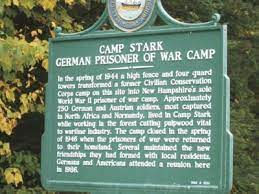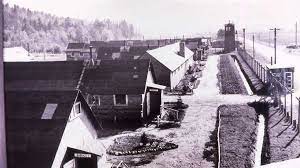Wartime Wednesday: New Hampshire’s POW Camp
With a population of less than five hundred people, Stark, New Hampshire is easy to overlook. However, it was one of many American small towns transformed during World War II. Named for Revolutionary War General John Stark whose famous words “live free or die” became the state motto, Stark is located in northern New Hampshire less than fifty miles from the Canadian/US border.
A paper manufacturer, The Brown Company couldn’t meet its quote of pulpwood needed for the war effort. Their number of employees had plummeted because many had enlisted, been drafted, or left the area for more lucrative positions in the defense industry. Enter Sherman Adams, a timberland manager in New Hampshire’s North Country who was about to become a congressman. He worked with U.S. Senator/Former Governor Styles Bridges to get a POW camp in place to provide workers for the paper company. Fortunately, home to a former Civilian Conservation Corp (CCC) camp, Stark already had a location that could be used that required little renovation.
About 250 German and Austrian soldiers, most of whom were captured in North Africa made up thepopulation of the POW camp. Interesting most of the inmates were members of the 999th Division, a collection of dissidents, communists, socialists, and perceived misfits who had once been imprisoned by the Nazis. The division had been created by Hitler to give members a “chance to redeem themselves for Germany.” The men were generally older and better educated than regular German troops. Some spoke multiple languages such as French, English, Dutch, Italian, and Norwegian. They worked in the forest cutting pulpwood.
By all accounts, the camp and town coexisted peacefully. Some of the guards met and married local women, and remained after the war. They were entertained at church suppers and invited into people’s homes for Sunday dinner or holidays. Eventually, the spirit of goodwill extended to the prisoners, and some of the residents brought gifts to the POWs. One of the inmates, Franz Bacher, was an artist, and he sketched pictures of the guards and painted portraits of the townspeople. Some of his artwork still hangs in the homes.
Bacher later escaped from the camp and managed to remain at large for over a month. He left a note: “I am going to escape today. The reason I am doing this is I live for my art. If I continue to cut wood, my hands will become so mutilated that I will be unable to paint. If I can’t paint, I can do nothing.”
Unfortunately for Bacher who was living in New York, he ran into Sergeant Ted Tausig, on a three-day leave from the prison camp. Tausig was an Austrian Jew who had escaped to America and joined the U.S. Army. The two had lived near each other in Vienna and became friends at Stark.
 |
| Photo: Salmon Press |
Despite being in operation for little more than two years, feelings apparently ran strong for some. In 1986, townspeople and former guards and prisoners held a reunion.
______________________
A Doctor in the House (A WWII Christmas Romance):
Emma O’Sullivan is one of the first female doctors to enlist after President Franklin Roosevelt signs the order allowing women in the Army and Navy medical corps. Within weeks, Emma is assigned to England to set up a convalescent hospital, and she leaves behind everything that is familiar. When the handsome widower of the requisitioned property claims she’s incompetent and tries to get her transferred, she must prove to her superiors she’s more than capable. But she’s soon drawn to the good-looking, grieving owner. Will she have to choose between her job and her heart?
Archibald “Archie” Heron is the last survivor of the Heron dynasty, his two older brothers having been lost at Dunkirk and Trondheim and his parents in the Blitz. After his wife is killed in a bombing raid while visiting Brighton, he begins to feel like a modern-day Job. To add insult to injury, the British government requisitions his country estate, Heron Hall, for the U.S. Army to use as a hospital. The last straw is when the hospital administrator turns out to be a fiery, ginger-haired American woman. She’s got to go. Or does she?
Purchase Link: https://amzn.to/3Ju7ZjY




Great post, Linda. This is one of the sites I will feature in the War Monument book. An important but little-known fact of NH History.
ReplyDeleteHappy New Year!
KB
I covered Stark when I was writing for NHToDo Magazine many years ago. A fascinating site. Happy new year, my friend!
Delete